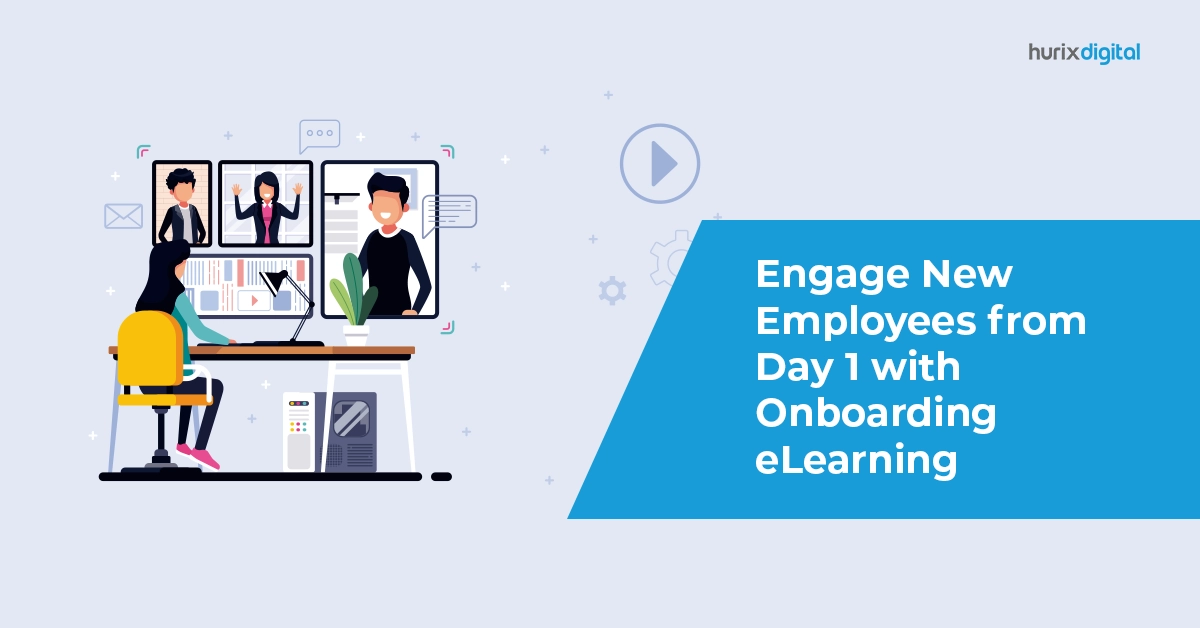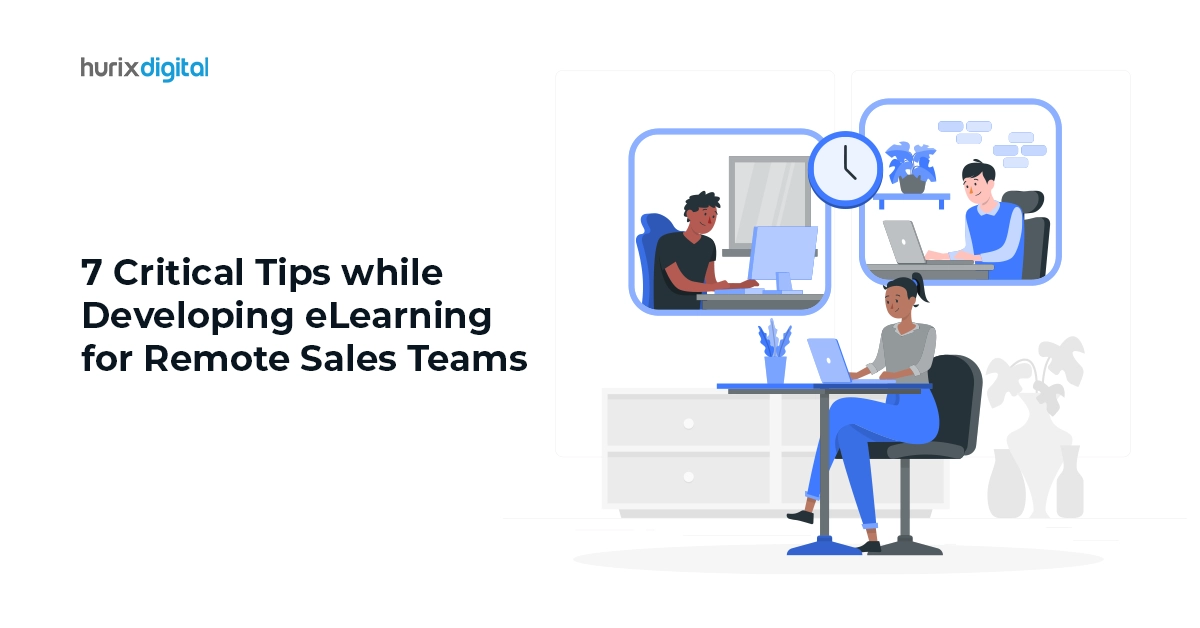
Important eLearning Courses Every Organization Should Deploy for Onboarding New Employees
Summary
This post details crucial eLearning courses designed to foster positive first impressions among new hires, covering important aspects to ensure a smooth transition.
Employee satisfaction and retention are essentially linked with how an organization onboards its new recruits. The prospects of an employee looking for a new role double due to a negative onboarding experience.
Engaging and immersive eLearning courses play a critical role in winning the hearts of new talents by offering them proper orientation. A positive onboarding experience increases the number of employees who choose to stay with the organization for 3+ years by 69%.
This post offers insights into the essential eLearning courses that an organization must deploy to create positive first impressions on new employees.
Table of Contents:
Key eLearning Courses for New Employees
Interactive eLearning or online training programs can provide training for new hires relatively faster than instructor-led classes. The organization can blend relevant information, insightful media, informative documents, fun activities, and assessments to offer a scalable, consistent, and 360-degree onboarding experience.
This section highlights the essential eLearning courses new recruits must take to unlock their full potential during employee orientation programs.
1. ‘Introduction to Core Team’ Course
During the initial days, the new hire may struggle to figure out whom to contact for ancillary support for their job profile. An eLearning course dedicated to introducing the hire to the core team and other essential office bearers can be immensely helpful.
The eLearning course should:
- Introduce the hire to important team members and other organizational stakeholders.
- Detail the relationship of the recruit’s department with other related departments.
The course can contain engaging images, videos, or audio clips to offer references. This way, the individual won’t be overwhelmed and can better remember names, roles, photos, departments, and job descriptions.
2. Course Offering Insights Into Organizational Dynamics
New hires are always eager to learn more about the organizational ethos so that they can align their professional priorities with it. In this bid, an eLearning course with the content outlined below can enrich employee induction programs.
- Introduction to organizational culture with a focus on mission, vision, and core guiding principles.
- Inputs on values and ethical conduct espoused by the organization.
- Information on rewards and recognitions available for good performers.
- Insights into important policies and key procedures.
- Knowledge of potential pitfalls to perform efficiently and productively.
- Views on the prevention of sexual harassment on the job.
Such a course would facilitate recruits’ understanding of the organizational environment, promoting a sense of engagement and belonging.
Also Read: Meeting the Needs of Changing Student Demographics and Workforce Demands
3. Course on New Hire’s Roles and Responsibilities
Each recruit is eager to learn more about their job profile from the organizational context. This knowledge gives them a better command of the job dynamics and helps them discharge their responsibilities efficiently and productively.
For this, an eLearning course that acquaints recruits with their specific roles and responsibilities, job expectations, KPIs (key performance indicators), appraisal cycles, important deliverables, etc., can prove valuable. This will help recruits build quick rapport with peers and managers, resulting in a more supportive and collaborative work environment.
4. Course on Organizational Code of Conduct
Every new employee must be familiarized with the organizational code of conduct and standing orders. This helps them adopt behavioral characteristics conducive to the organization’s cherished principles and steer clear of undesirable activities. However, reading such codes requires lots of patience.
eLearning course can make understanding policies interesting and enjoyable. An attention-grabbing course delineating the behavior expected out of employees can sink in well while evoking quick compliance.
The course must take a scenario-specific approach, with examples and case studies. This will help employees relate to the content and intuitively identify red flags that can land them in trouble. The assessment section must include different scenarios in which the employee is subjected to ethical dilemmas. The employee must navigate these dilemmas using appropriate codes of conduct.
5. Course on Workplace Well-being
Workplace stress or disgruntlement can cause recruits to experience anxiety and depression. An eLearning program detailing how employees can handle job pressure with poise and stay calm in the face of adversities should be integral to orientation training modules.
The program should offer strategies for managing temper, taking things in one’s stride, engaging in positive conversations, discarding misinformation, and resolving conflicts. It must also offer information about well-being forums, online or offline, available in the organization and the contact details of counselors who can assist employees.
6. Course for Job Skills Training
Job skills training can enhance the recruit’s ability to deliver seamlessly. To this end, an eLearning program offering insights into the key tools, techniques, frameworks, platforms, proprietary software, etc., can be crafted.
The course will arm recruits with relevant technical skills, communication etiquette, software knowledge, etc., needed for being a good and consistent performer. There should be a section for soft skills wherein tips should be shared about enhancing one’s professional efficiency through better interpersonal skills, problem-solving acumen, collaboration, etc.
The professional development training should focus on honing employee skills in dealing strategically with customers, acquiring comprehensive knowledge of products/services, and exploring avenues to enhance customer satisfaction.
7. Safety Training Course
Safety is integral for any job. New employees must be subjected to an eLearning program that offers them comprehensive insights into job hazards and preventive measures. Further, details of mitigation steps, safety champions, hazard identification, risk assessment, commonly accepted unsafe practices, etc., should be shared.
8. Course on Data Privacy
Data privacy is a burning topic. If an organizational employee is found to breach the confidentiality of sensitive data of third-party vendors or stakeholders, the organization can face severe penalties.
Hence, an exclusive eLearning program dedicated to raising awareness about privacy guidelines should be offered.
Check out EXCLUSIVE: Hurix Mini-Book: Effective Training Techniques For Enterprises With Distributed Workforce
Way Forward
The essential eLearning courses for new employees empower them with actionable insights that put them in the driver’s seat in the journey to achieving professional excellence.
The courses can be taken from the comfort of one’s home or on the go, which makes them more effective and less overwhelming for new hires. An expert team of organizational veterans should curate the online courses along with reputed instructional designers.
Hurix Digital is at the forefront of creating immersive, interactive, and effective eLearning modules aimed at making the onboarding process of new employees seamless. Share your organizational requirements with our seasoned team and embark on the journey of developing a self-motivated and thoroughly trained workforce.
So what are you waiting for? Contact us today!

A highly enthusiastic and motivated sales professional with over twenty five years of experience in solution selling of training-related applications and services. Maintains an assertive and dynamic style that generates results. Ability to establish long-term relationships with clients built on trust, quality of service and strategic vision. Specializes in financial services, higher ed, publishing and government in the areas of learning and development.








